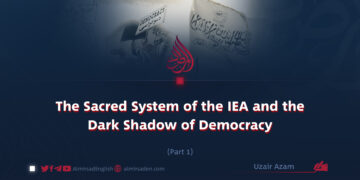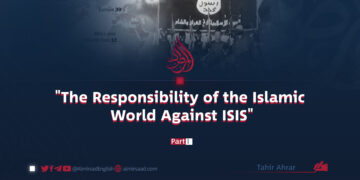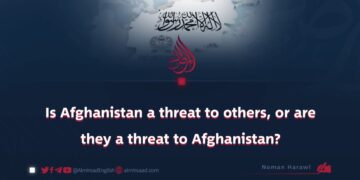Written by: Fawad Amiri
The Khawārij are a deviant sect that has not contributed any services to Islam and Muslims, and since their inception, they have been responsible for spreading façade and humiliation within the Ummah. The main reason for this is the fact that this deviant sect was trained, formed, and nurtured by the Jews and the hypocrites.
Why are they labeled as “Khawārij”?
How do their actions end up relating them to this label?
The terms “Khawārij” or “Khāriji” are derived from the imperative verbs “Kharajā, Yakhrujū, Khurūjan,” which generally mean ‘to rebel.’ Hence, those who oppose and rebel against the Muslim ruler may also be called “Khawārij, and similarly, a group known to spread facade throughout the lands can also be labeled as “Khawarij”.
Where and how did the Khawārij originate? What were their aims and objectives (from their standpoint)?
The Khawārij initially emerged as a consequence of the political division present amongst the Muslim Ummah near the end of Uthman Bin Affan’s (RA) Caliphate and during the Caliphate of Ali Bin Abi Talib (RA).
When they emerged, they declared their presence in the form of a group; however, there were some people even during the time of the Prophet (SAW) who exhibited signs of the Khawārij within them.
During the Ghazwa of Hunayn, the Messenger of Allah (SAW) was distributing war booty among the Hozan tribe, and suddenly, a man from the Bani Tamim tribe by the names “Dhu’l-Khuwaisra Al-Tamimi” and also “Harqus bin Zuhair” stood up and proclaimed in a rude manner, “O Muhammad! Be just!”
The Prophet responded to him by saying: Who else do you expect to do justice to you if not me?
Upon hearing this, Umar (RA) became enraged, stood up, and said, “Give me permission to chop off his neck.” However, the Prophet responded by saying, “Leave him alone, he belongs to a group whose prayers and fasts you will consider superior to your own, yet they will depart from religion with all these acts of worship as an arrow departs from the bow.”
The term Khawārij was later used for the opponents of the Qur’an and the Sunnah who held extreme and radical beliefs and dared to rebel against Ali (RA) in the Battle of Siffin and resided in a place known as Harura. The reason they were labeled with this term was primarily due to their rebellion and Khurooj against the Caliph of the time, whom it was obligatory to obey according to the Shari’a. These rebels were a group of hardliners who initially compelled Ali RA to assume the seat of caliph, and then later rose up against him and rebelled.
Initially, they sided with Ali RA and allied with him, but when it came to drafting a “hukm” to resolve the conflict with Mu’awiya RA, they proceeded to rebel against him in the Battle of Siffin.
They raised slogans of “Inil Hukmū Illā Lillāh,” emphasizing that nobody else’s Hukm mattered except Allah (not even the setting up of Shar’i courts!) This was the slogan they repeatedly uttered, further stating that Mu’awiyah RA must be fought, and that any form of reconciliation or peace treaty with him would be Haram.
However, to everyone’s surprise, Ali RA forbade excommunicating them from the religion and treating them harshly, and then he said to them with all due respect:
You have three rights upon us:
1. We won’t obstruct you from praying in the city’s mosques, and you would be welcome in our gatherings.
2. Your livelihoods will be provided for by the Bayt Al Maal (National Treasury) as long as you’re with us.
3. We won’t engage in combat with you as long as you keep your swords sheathed and refrain from initiating war.
However, it wasn’t long before they exploited Ali’s (RA) leniency and declared war upon him at Nahrawan, which we will thoroughly discuss in upcoming episodes – In Shaa Allah.



















































